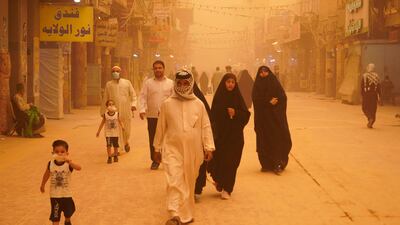The Gulf's climate is on the whole a major asset. In 2019, inbound tourism spending in the GCC stood at more than $81 billion. Reliable sun is a key pull factor. It pays in other regards, too. According to a 2019 report by the International Renewable Energy Agency, solar energy represents 91 per cent of the potential renewable power generation currently being pursued in the ambitious green strategies of GCC countries.
But when the weather is not favourable, it can have serious consequences.
That is happening this week, as a massive dust and sand storm descends on the region, bringing extraordinarily high levels of dust and pollutants, particularly in Kuwait, Saudi Arabia and Iraq. People are being recommended to stay indoors, especially babies and at-risk groups, and to avoid physical exercise. Transport has also been affected. In the early afternoon of Tuesday, visibility at Qatar's main airport was less than a kilometre. Countries where there are strong north-westerly winds, such as Saudi Arabia, Kuwait and Iraq, tend to fare the worst of all when storms hit.
But they do not only affect the Gulf. At the beginning of the year, areas of India and Pakistan saw similar conditions. The results are even worse where poverty is high. A report published in the journal The Lancet Planetary Health found that 9 million people died as a result of pollution in 2019, much of it from the air. Deaths were disproportionately likely in poorer areas.
A particular concern for that region is the effect on agriculture, especially cotton, of which India supplies 26 per cent of the global stock. Even the richest farmers cannot escape such catastrophes. Some experts say that the 2001 foot and mouth disease outbreak in the UK, which resulted in the culling of 6 million sheep and cattle, was caused by a large storm in North Africa spreading spores.
Unfortunately, these storms are a natural part of life. For years the Gulf region has been living through them, particularly in the summer months. They have been described for centuries, frequently an evocative trope in some of the Arab world's most famous poems. Arthur John Arberry's translation of pre-Islamic poet Imru Al Qais's Muallaqa reads: "Friend, do you see yonder lightning? Look, there goes its glitter flashing like two hands now in the heaped-up, crowned storm cloud."
Living through these storms in a tent hundreds of years ago would have been a more evocative, far more dangerous affair than today, when strong buildings, air filtration and scientific understanding offers some protection. But it would also have been less common. A report published in 2017 found that the number of storms in the region is expected to increase due to the effects of climate change, a visible reminder of the pressing need to embrace the green transition.
Most importantly, on a personal level, it is time for more efforts to tackle deforestation in a number of countries and find long term solutions to the effects of climate change.









































